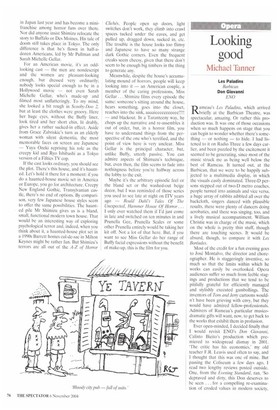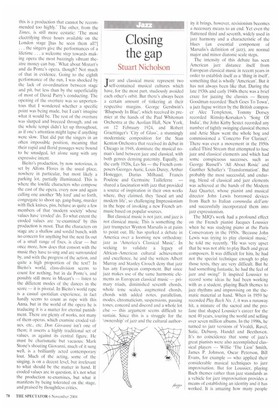0 , era
Looking good
Michael Tanner
Les Paladins Barbican Don Giovanni ENO
Rameau's Les Paladins, which arrived briefly at the Barbican Theatre, was spectacular, amazing. Or rather this production was. It was one of those occasions when so much happens on stage that you can begin to wonder whether there's something — or nothing — to hide. I had listened to it on Radio Three a few days earlier, and been puzzled by the excitement it seemed to be generating, since most of the music struck me as being well below the best of Rameau. It turned out, at the Barbican, that we were to be happily subjected to a multimedia display, in which the visuals easily dominated. Three-D persons stepped out of two-I) metro coaches, people turned into animals and vice versa, a huge array of rabbits nibbled all over the backcloth, singers danced with plausible results, there were plenty of dancers doing acrobatics, and there was singing, too, and a lively musical accompaniment. William Christie was in charge of the music, which on the whole is pretty thin stuff, though there are touching scenes. It would be absurd, though, to compare it with Les Boreades.
Most of the credit for a fun evening goes to Jose Montalvo, the director and choreographer. He is staggeringly inventive, so much so that the limits within which he works can easily be overlooked. Opera audiences suffer so much from feeble stagings and productions that we tend to be pitifully grateful for efficiently managed and stylishly executed gambollings. The inventors of Tom and Jerry cartoons wouldn't have been grieving with envy, but they would have admired fellow-professionals. Admirers of Rameau's particular musicodramatic gifts will want, now, to get back to the works that exhibit them in profusion.
Ever open-minded, I decided finally that I would revisit ENO's Don Giovanni, Calixto Bieito's production which premiered to widespread dismay in 2001. The critic has his economies,' my old teacher F.R. Leavis used often to say, and I thought that this was one of mine. But passing the Coliseum a few days ago, I read two lengthy reviews posted outside. One, from the Evening Standard, ran, 'So depraved and dirty, this Don deserves to be seen . . for a compelling re-examination of eroded values in modern society,
this is a production that cannot be recommended too highly.' The other, from the Times, is still more ecstatic: 'The most electrifying three hours available on the London stage [has he seen them al]?[ . . . the singers give the performances of a
lifetime . a welcome step towards making opera the most buzzingly vibrant theatre money can buy. What about Mozart's and da Ponte's opera, though? Not much of that in evidence. Going to the eighth performance of the run, I was shocked by the lack of co-ordination between stage and pit, hut less than by the superficiality of most of David Parry's conducting. The opening of the overture was so unportentous that I wondered whether a specific point was being made, but I can't imagine what it would be. The rest of the overture was slurped and breezed through, and on the whole tempi didn't let up throughout, as if one's attention might lapse if anything were slow. That did put the singers in an often impossible position, meaning that their rapid and florid passages were bound to be smudged, let alone sung with any expressive intent.
Bieito's production, by now notorious, is set by Alfons Flores in the usual place, nowhere in particular, but most likely a parking lot, partially illuminated. This is where the lowlife characters who compose the cast of the opera, every now and again calling one another 'My lord' and so forth, congregate to shoot up, gang-bang, murder with flick knives, piss, behave as quite a few members of that 'modern society' whose values have 'eroded' do. To what extent the eroded values are 're-examined' by this production is moot. That the characters on stage are a shallow and sordid bunch, with no concern for anything but the next fix out of a small range of fixes, is clear — but once more, how does that consort with the music they have to sing and are surrounded by, and with the progress of the action, and quite a high proportion of the text? In Bieito's world, class-division seems to count for nothing, hut in da Ponte's, and possibly still more in Mozart's — listen to the different modes of the dances in the score — it is pivotal. In Bieito's world rape is a casual quotidian experience, in fact hardly seems to count as rape with this Anna, but in the world of the opera he is traducing it is a matter for eternal punishment. There are plenty of works, not many of them operas, which examine eroded values, etc., etc. Don Giovanni isn't one of them; it asserts a highly traditional set of values, as against its central figure. He must be charismatic but vacuous; Mark Stone's shouting Giovanni, much of it sung well, is a brilliantly acted contemporary lout. Much of the acting, some of the singing, is on a decent level, but irrelevant to what should be the matter in hand. If eroded values are in question, it's not what the production re-examines, but what it manifests by being tolerated on the stage, and praised by thoughtless critics.



























































































































 Previous page
Previous page